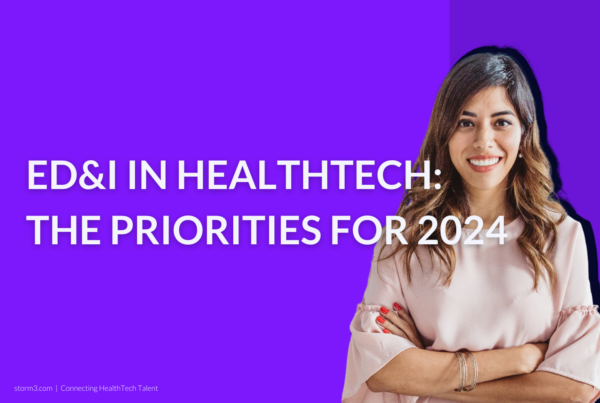The healthcare industry is on the precipice of a technological revolution that will reshape the way we approach medical care. With the convergence of transformative technologies and the increasing demand for innovative solutions, the future of HealthTech is poised for unprecedented growth and advancement. In this article, we will explore the major trends that are revolutionizing healthcare in 2024 and beyond.
The year 2024 holds immense promise for the healthcare industry, driven by key societal drivers such as a longer-living population, transformative technologies, and global economic uncertainty. These factors will shape the landscape of healthcare, paving the way for groundbreaking innovations and advancements.
AI’s Influence on Healthcare
One of the driving forces behind these trends is the emergence of artificial intelligence (AI). AI has the potential to revolutionize every aspect of healthcare, from drug development and patient treatment to the business and commercial side of the industry. Its impact will be felt across various trends that we will explore in this article.
Artificial intelligence, particularly generative AI, is set to make a significant impact on healthcare in 2024. Generative AI democratizes access to other transformative AI applications, making it easier to implement and interpret results. It enables the generation of synthetic data, which can be used to train medical AI algorithms while protecting patient privacy. Additionally, generative AI can create chatbots and virtual assistants to assist patients throughout their healthcare journey. The applications of generative AI in healthcare are limitless.
Personalized Medicine
Personalized medicine is the creation of tailored treatment plans for individual patients, and it is increasingly being facilitated by technology and data. Genomics, in particular, leverages AI to analyze patients’ DNA, enabling the diagnosis and treatment of diseases at a molecular level. Personalized medicine leads to better patient outcomes, more efficient use of medical resources, and addresses the challenges of the future.
Virtual Healthcare Assistants
Virtual healthcare assistants and chatbots have the potential to revolutionize healthcare delivery. These AI-powered assistants can provide advice, answer patient questions, connect patients with necessary information, and even schedule appointments. By integrating with electronic health record systems, virtual healthcare assistants streamline patient care and improve compliance with treatment plans. They also offer companionship to patients, enhancing mental health support.
Digital Twins
Digital twins, virtual models of real-world systems, objects, or processes, offer immense potential in healthcare. They enable the simulation of medical devices, treatments, and lifestyle choices, allowing healthcare professionals to understand their impact without risking patient safety. For example, digital twins of organs can model the effects of changes in treatment and medication. The development of a digital twin of the human brain is a complex yet promising endeavor.
IoT-Powered Virtual Hospitals and Telemedicine 2.0
The combination of telemedicine and the Internet of Things (IoT) is transforming healthcare delivery. Telemedicine, in its advanced form known as Telemedicine 2.0, enables holistic remote patient care and treatment. Wearable devices connected to the IoT allow for the remote monitoring of patients, reducing the need for in-person visits. Virtual hospitals act as centralized hubs for monitoring patients in their own homes, improving access to care and reducing hospitalizations.
Preventative Healthcare
The shift from reactive to proactive approaches is a strategic priority for healthcare providers in 2024. Preventative healthcare encompasses various practices, including exercise, wellness, and immunizations. Technological advancements, such as AI and wearable technology, play a significant role in enabling early warning systems and facilitating rapid intervention. Preventative healthcare improves patient outcomes and reduces healthcare costs associated with preventable conditions.
Virtual and Augmented Reality in Healthcare
Virtual reality (VR) and augmented reality (AR) are gaining traction in healthcare for their diverse applications. VR is proving to be effective in managing chronic pain, surpassing traditional pharmaceutical pain management methods. AR is increasingly used by surgeons to provide real-time information without the need for separate screens, enhancing surgical precision. Wound care management also benefits from AR, enabling non-invasive assessment and personalized treatment options.
Elderly Care
The aging population poses significant challenges for healthcare systems worldwide. Innovative solutions that enable the elderly to remain in their homes for longer are gaining prominence. By leveraging technology, elderly care can be personalized, enabling independent living and reducing the strain on healthcare facilities. Additionally, research focuses on developing treatments for age-related diseases such as Alzheimer’s and Parkinson’s.
3D Printing – From Implements to Organs
Additive manufacturing, particularly 3D printing, has the potential to revolutionize healthcare. It enables the on-demand production of tools, devices, and even organs. In regions with limited access to medical equipment, 3D printing can address the shortage by printing surgical instruments, orthopedic implants, and prosthetics. Researchers are also exploring the viability of 3D-printed organs, which could alleviate the shortage of transplantable organs and reduce costs.
Convergence of Mental and Physical Healthcare Delivery
The COVID-19 pandemic has highlighted the need for a holistic approach to healthcare that addresses both physical and mental well-being. In 2024, healthcare providers will increasingly recognize the intrinsic links between mental and physical health. This convergence will result in improved screening for mental health issues and a comprehensive approach to treatment and recovery. Primary care physicians will play a crucial role in identifying and addressing mental health’s impact on physical ailments.
The trends shaping the future of HealthTech in 2024 are driven by the need to address societal challenges, leverage transformative technologies, and enhance patient care. From generative AI and personalized medicine to virtual healthcare assistants and 3D printing, the possibilities are vast. As the healthcare industry embraces these trends, it will pave the way for a future where healthcare is more personalized, accessible, and efficient. By harnessing the power of technology, we can revolutionize healthcare and improve the lives of patients worldwide.
To benefit from a personalised perspective from a HealthTech recruitment specialist, please don’t hesitate to get in touch with us here at Storm3.






